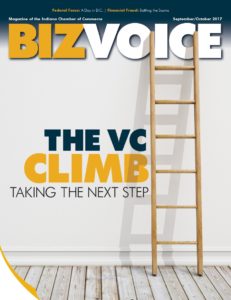[tube]3tKl7bBrDWc&feature[/tube]
Eli Lilly Federal Credit Union, now known as Elfcu, has served Lilly's employees and their families for over 80 years. In 2008, the credit union began to add membership from Select Employer Groups as it became more independent from Lilly itself. Now, employees from selected companies are eligible for Elfcu membership as a no cost voluntary benefit.
Aside from its array of services, Elfcu has separated itself as a leader in financial wellness.
"We are a financial wellness provider that happens to be a credit union," explains communications and education manager Michelle Payne. "We strive to understand not just what our customers want but to understand what their goals are so we can help them make the right financial choices. We're not just about our products and transactions here, but about our members' overall financial success."
As an example, Elfcu recently launched a partnership with financial guru "Pete The Planner" (Peter Dunn) with its "Fastest Way to $5K" 12-week educational program. Dunn recommends ways consumers can acquire the most savings, and Elfcu offers the tools and programs to help them achieve those goals.
When asked how economic conditions have impacted Elfcu's operations, business development manager Todd Shickel contends credit unions were dealt a softer blow than some.
"The credit unions have always been a safe haven for a member's banking services, so we didn't feel the impact of the financial tsunami like many financial institutions did," he relays. "Some financial institutions were impacted, but we have very responsible lending programs designed to be a better fit for the consumer — not what will generate the most revenue for the credit union."
He adds that the biggest change he's seen recently is in the realm of health savings — a change that emphasizes why financial wellness is so important.
"Employers have started to go to the high deductible, consumer-driven health plans," Shickel says. "They have a tool that goes with them called a health savings account — and we have a very robust health savings account platform that helps differentiate us in the marketplace. It gives the members a portal and tools to become better health care consumers… In the newer high deductible plans, it's up to the consumer to find the best services, and they have a stake in those services."
Elfcu, which boasts a global membership base, also works to parlay technology to give its clients the best possible service.
"Our access options really do exceed a lot of our larger banking competitors," Payne notes. "We launched mobile banking (elfcuMOBILE) last summer, which features a smartphone app and text banking for those without a smartphone. One fantastic feature is the remote deposit capture, so you can snap a photo of your check and upload it for a deposit. We also have a dynamic eBranch Internet banking system that we're continually updating."
She adds that beyond those electronic options, Elfcu offers more than 5,000 shared branches nationwide and a surcharge-free network of over 60,000 ATMs.
See Elfcu's entire video series on its YouTube page, and be sure to explore its newly designed web site at elfcu.org, including its new Life Lessons financial wellness blog.


 The
The